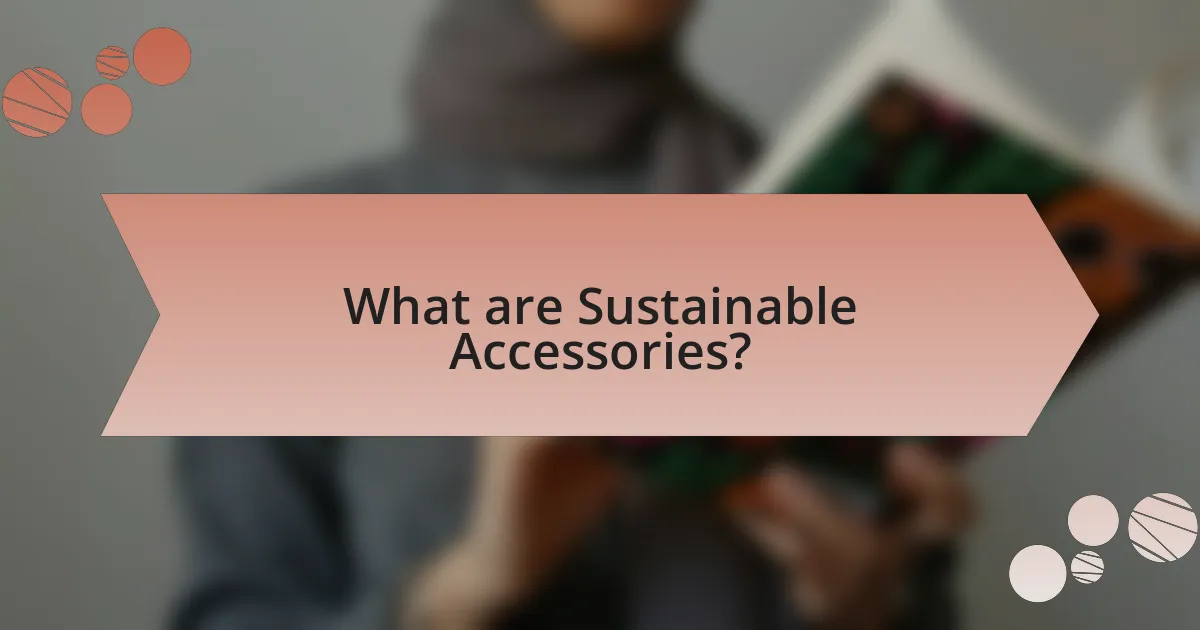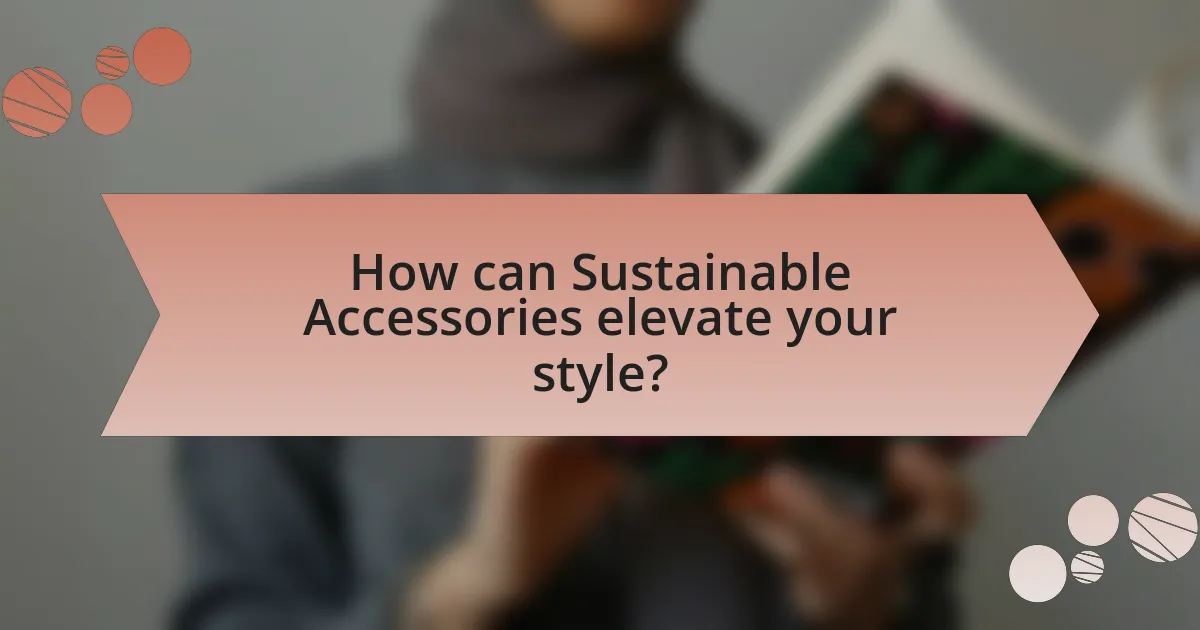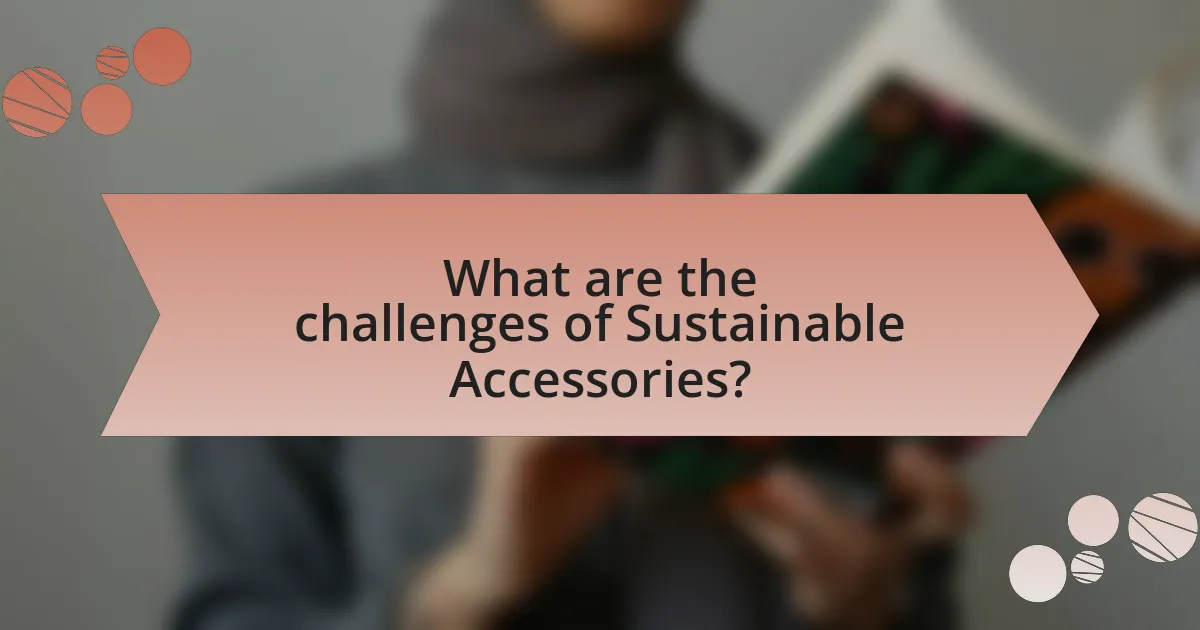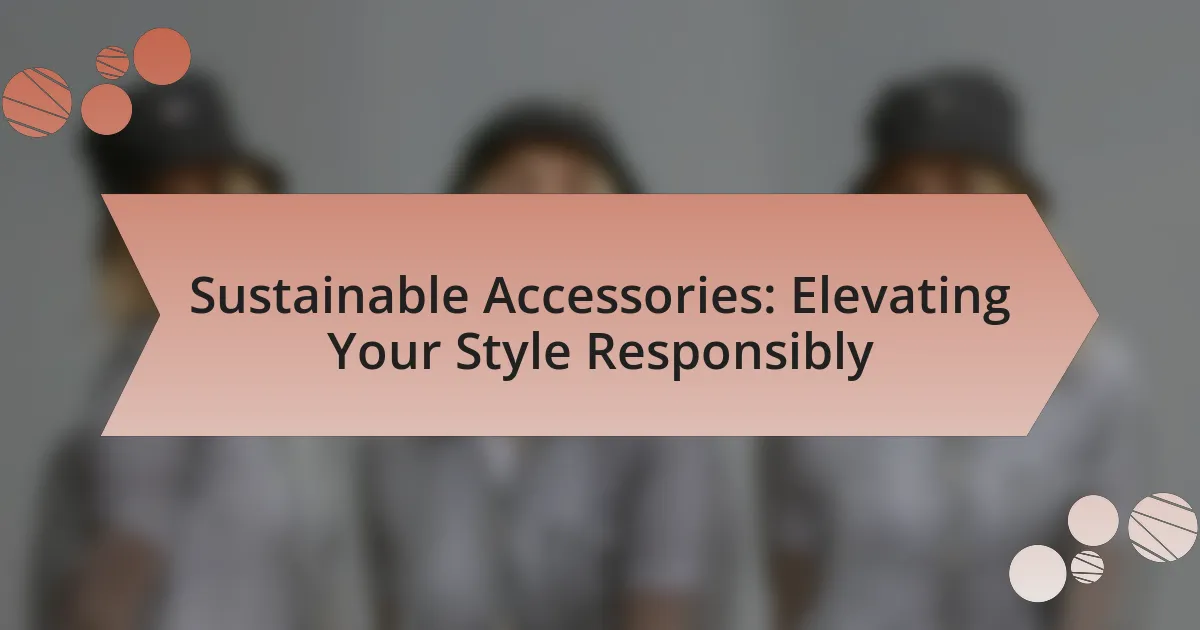Sustainable accessories are fashion items crafted from eco-friendly materials and produced through environmentally responsible practices, aiming to minimize ecological impact. This article explores the differences between sustainable and traditional accessories, highlighting the materials commonly used, such as organic cotton and recycled plastics, and the importance of ethical sourcing. It discusses the environmental and social benefits of choosing sustainable accessories, including reduced waste and support for fair labor practices. Additionally, the article addresses common misconceptions, challenges in the sustainable fashion market, and practical tips for integrating sustainable accessories into personal style, emphasizing the growing consumer demand for responsible fashion choices.

What are Sustainable Accessories?
Sustainable accessories are fashion items designed and produced with environmentally friendly practices and materials, minimizing their ecological impact. These accessories often utilize recycled, organic, or ethically sourced materials, and are manufactured through processes that reduce waste and carbon emissions. For instance, brands may use vegan leather made from recycled plastics or natural fibers like organic cotton, which require fewer chemicals and water compared to conventional materials. The rise of sustainable accessories reflects a growing consumer demand for products that align with ethical and environmental values, contributing to a more responsible fashion industry.
How do Sustainable Accessories differ from traditional accessories?
Sustainable accessories differ from traditional accessories primarily in their materials and production processes, focusing on environmental responsibility. Traditional accessories often utilize non-renewable resources and may involve harmful manufacturing practices, while sustainable accessories are made from eco-friendly materials such as organic cotton, recycled metals, or biodegradable substances. For instance, a study by the Ellen MacArthur Foundation highlights that the fashion industry contributes to 92 million tons of waste annually, emphasizing the need for sustainable alternatives that minimize environmental impact.
What materials are commonly used in Sustainable Accessories?
Sustainable accessories commonly utilize materials such as organic cotton, recycled polyester, bamboo, cork, and vegan leather. Organic cotton is grown without harmful pesticides, reducing environmental impact. Recycled polyester, made from post-consumer plastic bottles, diverts waste from landfills and conserves resources. Bamboo is a fast-growing plant that requires minimal water and no pesticides, making it an eco-friendly choice. Cork, harvested from the bark of cork oak trees, is renewable and biodegradable. Vegan leather, often made from materials like polyurethane or plant-based sources, provides an animal-friendly alternative to traditional leather. These materials collectively contribute to reducing the ecological footprint of fashion accessories.
Why is the sourcing of materials important for sustainability?
The sourcing of materials is crucial for sustainability because it directly impacts environmental health, resource conservation, and social equity. Sustainable sourcing ensures that materials are obtained in a way that minimizes ecological damage, such as deforestation and pollution, while promoting the use of renewable resources. For instance, according to the World Resources Institute, sustainable sourcing practices can reduce greenhouse gas emissions by up to 30% in certain industries. Additionally, responsible sourcing supports fair labor practices and community development, contributing to social sustainability. Thus, the way materials are sourced plays a vital role in achieving overall sustainability goals.
What are the benefits of choosing Sustainable Accessories?
Choosing sustainable accessories offers environmental benefits, such as reducing waste and minimizing carbon footprints. Sustainable accessories are often made from eco-friendly materials, which helps conserve natural resources and decrease pollution. For instance, using recycled materials can significantly lower energy consumption compared to producing new materials. Additionally, sustainable accessories often support ethical labor practices, ensuring fair wages and safe working conditions for artisans and workers. This commitment to ethical production fosters a more equitable economy. Furthermore, consumers increasingly prefer sustainable products, with a 2021 survey indicating that 66% of global consumers are willing to pay more for sustainable brands, highlighting the growing market demand for eco-conscious choices.
How do Sustainable Accessories impact the environment?
Sustainable accessories positively impact the environment by reducing waste and minimizing resource consumption. These accessories are often made from eco-friendly materials, such as organic cotton, recycled metals, and biodegradable plastics, which decrease the reliance on virgin resources and lower carbon emissions during production. For instance, a study by the Ellen MacArthur Foundation highlights that using recycled materials can reduce greenhouse gas emissions by up to 70% compared to traditional manufacturing processes. Additionally, sustainable accessories promote ethical labor practices, which contribute to social sustainability, further enhancing their positive environmental impact.
What social benefits arise from the production of Sustainable Accessories?
The production of sustainable accessories generates significant social benefits, including job creation in local communities and the promotion of fair labor practices. By prioritizing ethical sourcing and production methods, companies contribute to economic stability and empower workers, often providing them with fair wages and safe working conditions. For instance, brands that focus on sustainable materials frequently collaborate with artisans and small-scale producers, fostering community development and preserving traditional craftsmanship. This approach not only enhances the livelihoods of individuals involved but also encourages a culture of sustainability and social responsibility within the fashion industry.

How can Sustainable Accessories elevate your style?
Sustainable accessories can elevate your style by offering unique designs that reflect ethical values and environmental consciousness. These accessories often utilize eco-friendly materials, such as organic cotton, recycled metals, or sustainably sourced wood, which not only enhance aesthetic appeal but also promote a responsible fashion ethos. For instance, brands like Stella McCartney and Veja have gained recognition for their stylish yet sustainable products, demonstrating that fashion can be both chic and environmentally friendly. By incorporating sustainable accessories into your wardrobe, you not only enhance your personal style but also contribute to a growing movement that prioritizes sustainability in fashion.
What styles and trends are associated with Sustainable Accessories?
Sustainable accessories are characterized by minimalist designs, upcycled materials, and ethical production practices. These styles often emphasize functionality and durability, reflecting a shift towards conscious consumerism. Trends include the use of organic fabrics, biodegradable materials, and handcrafted items that support local artisans. For instance, brands like Stella McCartney and Reformation showcase collections that prioritize sustainability while maintaining contemporary aesthetics, demonstrating that eco-friendly choices can align with modern fashion sensibilities.
How can you incorporate Sustainable Accessories into your wardrobe?
To incorporate sustainable accessories into your wardrobe, prioritize items made from eco-friendly materials such as organic cotton, recycled metals, or vegan leather. Research shows that the fashion industry is responsible for 10% of global carbon emissions, highlighting the importance of choosing sustainable options. By selecting accessories from brands that emphasize ethical production practices and transparency, you can significantly reduce your environmental impact while enhancing your style. Additionally, consider thrifting or swapping accessories to promote a circular economy, which further supports sustainability in fashion.
What are some examples of brands that offer stylish Sustainable Accessories?
Some examples of brands that offer stylish sustainable accessories include Stella McCartney, known for its commitment to cruelty-free fashion; Veja, which produces eco-friendly sneakers using organic materials; and Toms, recognized for its socially responsible practices and sustainable footwear. These brands exemplify the integration of style and sustainability, utilizing ethical sourcing and environmentally friendly production methods to create fashionable accessories.
Why is it important to support sustainable fashion?
Supporting sustainable fashion is important because it reduces environmental impact and promotes ethical labor practices. The fashion industry is responsible for approximately 10% of global carbon emissions and significant water pollution, making sustainable practices essential for mitigating climate change and preserving natural resources. By choosing sustainable fashion, consumers encourage brands to adopt eco-friendly materials and fair labor conditions, fostering a more responsible industry. Studies show that sustainable fashion can reduce water usage by up to 90% compared to conventional methods, highlighting its potential for positive change.
How does consumer choice influence the fashion industry?
Consumer choice significantly influences the fashion industry by dictating trends, production practices, and sustainability efforts. As consumers increasingly prioritize ethical and sustainable options, brands are compelled to adapt their offerings to meet these demands. For instance, a 2021 survey by McKinsey & Company found that 67% of consumers consider the use of sustainable materials when making fashion purchases, prompting brands to invest in eco-friendly materials and transparent supply chains. This shift in consumer preference not only drives innovation in sustainable fashion but also pressures companies to adopt more responsible practices, ultimately reshaping the industry’s landscape.
What role do certifications play in identifying Sustainable Accessories?
Certifications play a crucial role in identifying sustainable accessories by providing verified standards that products must meet to be considered environmentally friendly and ethically produced. These certifications, such as Global Organic Textile Standard (GOTS) and Fair Trade, ensure that materials are sourced sustainably, labor practices are fair, and environmental impacts are minimized. For instance, GOTS certification requires that at least 70% of the textile is made from organic fibers, which directly supports sustainable agriculture and reduces chemical use. Thus, certifications serve as reliable indicators for consumers seeking to make responsible purchasing decisions in the realm of sustainable fashion.

What are the challenges of Sustainable Accessories?
The challenges of sustainable accessories include high production costs, limited availability of eco-friendly materials, and consumer awareness. High production costs arise from the use of sustainable materials and ethical labor practices, which can make these products more expensive than conventional alternatives. Limited availability of eco-friendly materials restricts manufacturers’ ability to scale production, as sourcing sustainable options can be difficult and inconsistent. Additionally, consumer awareness remains a challenge; many consumers are not fully informed about the benefits of sustainable accessories, leading to lower demand. According to a 2021 survey by McKinsey, only 30% of consumers prioritize sustainability when making fashion purchases, highlighting the need for increased education and marketing efforts in this area.
What are common misconceptions about Sustainable Accessories?
Common misconceptions about sustainable accessories include the belief that they are always more expensive, less stylish, and less durable than conventional options. Many consumers assume that sustainable accessories, due to their eco-friendly materials and ethical production processes, come with a higher price tag; however, studies show that prices can be competitive, especially when considering the long-term value and durability of these products. Additionally, the notion that sustainable accessories lack style is inaccurate, as many brands prioritize design and aesthetics, offering trendy options that appeal to a wide audience. Finally, the idea that sustainable accessories are less durable is misleading; in fact, many are crafted from high-quality materials designed to last, reducing the need for frequent replacements and ultimately benefiting both the consumer and the environment.
How can consumers overcome these misconceptions?
Consumers can overcome misconceptions about sustainable accessories by educating themselves on the materials and production processes involved. Research indicates that understanding the environmental impact of materials, such as organic cotton or recycled plastics, helps consumers make informed choices. For instance, a study by the Ellen MacArthur Foundation highlights that using recycled materials can significantly reduce carbon emissions compared to virgin materials. Additionally, consumers can seek certifications like Fair Trade or Global Organic Textile Standard (GOTS) to verify the sustainability claims of products. Engaging with brands that transparently share their sustainability practices further empowers consumers to distinguish between genuine sustainable options and greenwashing.
What are the limitations of current Sustainable Accessories?
Current sustainable accessories face limitations such as higher production costs, limited availability of eco-friendly materials, and challenges in scalability. Higher production costs arise from the use of sustainable materials and ethical labor practices, which can make these products less accessible to consumers. Limited availability of eco-friendly materials restricts the variety and innovation in sustainable accessory designs. Additionally, scalability issues hinder mass production, making it difficult for brands to meet growing consumer demand while maintaining sustainability standards. These factors collectively impact the market penetration and consumer adoption of sustainable accessories.
How can you make informed choices when purchasing Sustainable Accessories?
To make informed choices when purchasing sustainable accessories, consumers should prioritize products made from eco-friendly materials, verify certifications, and research the brand’s ethical practices. Eco-friendly materials, such as organic cotton, recycled metals, and biodegradable plastics, significantly reduce environmental impact. Certifications like Fair Trade or Global Organic Textile Standard (GOTS) provide assurance of sustainable practices. Additionally, researching a brand’s commitment to sustainability, including their supply chain transparency and labor practices, helps ensure that purchases support ethical production. According to a 2021 report by McKinsey & Company, 67% of consumers consider sustainability when making purchasing decisions, highlighting the importance of informed choices in promoting responsible consumption.
What should you look for in terms of quality and sustainability?
When evaluating quality and sustainability in accessories, prioritize materials that are eco-friendly, such as organic cotton, recycled metals, or sustainably sourced wood. These materials reduce environmental impact and promote responsible sourcing practices. Additionally, assess the durability of the product; high-quality items tend to last longer, minimizing waste and the need for frequent replacements. Certifications like Fair Trade or Global Organic Textile Standard (GOTS) can also indicate adherence to sustainable practices. Research shows that products made from sustainable materials can reduce carbon footprints by up to 30%, reinforcing the importance of choosing responsibly sourced accessories.
How can you verify the sustainability claims of a brand?
To verify the sustainability claims of a brand, examine third-party certifications such as Fair Trade, Global Organic Textile Standard (GOTS), or the Forest Stewardship Council (FSC). These certifications provide independent validation of a brand’s sustainability practices, ensuring adherence to specific environmental and social standards. Additionally, review the brand’s transparency regarding its supply chain, materials used, and production processes, as detailed information can indicate genuine commitment to sustainability. Brands that publish sustainability reports or engage in life cycle assessments further demonstrate accountability and provide measurable data on their environmental impact.
What are some practical tips for integrating Sustainable Accessories into your lifestyle?
To integrate sustainable accessories into your lifestyle, prioritize purchasing items made from eco-friendly materials, such as organic cotton, recycled metals, or biodegradable plastics. Research indicates that using sustainable materials can significantly reduce environmental impact; for instance, organic cotton uses 91% less water than conventional cotton. Additionally, support brands that practice ethical manufacturing and transparency in their supply chains, as this promotes fair labor practices and reduces exploitation. Incorporating second-hand or vintage accessories also contributes to sustainability by extending the lifecycle of products and minimizing waste. Lastly, consider DIY projects to repurpose old accessories, which fosters creativity and reduces the need for new purchases.
